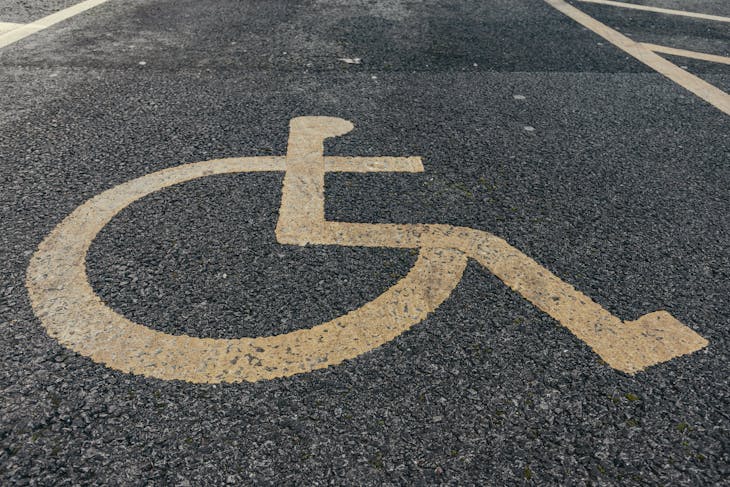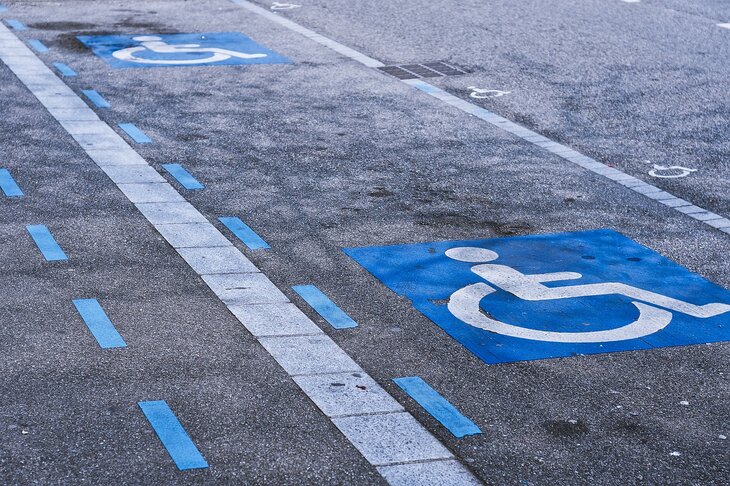Dealing with life as a disabled person is no picnic, but having a handicap permit in Kansas can significantly ease everyday challenges. This full guide will walk you through every step of getting a handicap permit in Kansas, from determining eligibility to properly using and renewing your permit. We’ll also address common questions and provide valuable resources to help you understand your rights and responsibilities.
Understanding Handicap Permits in Kansas
A handicap permit, also known as a disabled parking placard or plate, gives people with mobility impairments the right to park in designated spaces closer to building entrances. Likewise, these spaces offer easier access to public and private facilities, making everyday tasks more manageable for those with disabilities.
Why You Might Need a Handicap Permit
Handicap permits are essential for anyone with a disability or medical condition that limits their ability to walk long distances. Without a permit, parking far from an entrance can exacerbate pain or make it difficult to access necessary services. Whether you have a temporary injury or a permanent condition, a handicap permit can provide the accessibility you need to maintain your independence.
Types of Handicap Permits Available in Kansas
Kansas offers several types of handicap permits, catering to various needs:
- Temporary Handicap Permits: These are valid for up to six months and are intended for people with temporary disabilities or injuries, such as a broken leg or a post-surgery recovery period.
- Permanent Handicap Permits: Issued to those with long-term or permanent disabilities, these permits are valid for three years and you must renew them periodically.
- Handicap License Plates: For those with permanent disabilities, Kansas also offers handicap license plates, which replace the standard license plate on your vehicle and provide the same parking privileges as a placard.
Who Qualifies for a Handicap Permit in Kansas?
To qualify for a handicap permit in Kansas, you must meet specific medical criteria. In this case, the state defines eligibility based on several factors, including:
- Inability to walk 200 feet without stopping to rest.
- Need of a wheelchair, cane, crutches, prosthetic device, or other assistive devices for mobility.
- Cardiac conditions classified as Class III or IV by the American Heart Association.
- Severe limitations in mobility due to arthritic, neurological, or orthopedic conditions.
- Lung disease that restricts your forced respiratory volume or arterial oxygen tension to specific standards.
A licensed physician, advanced registered nurse practitioner (ARNP), or physician assistant (PA) must certify your condition on your application, ensuring that only those who genuinely need the permit receive it.

How to Apply for a Handicap Permit in Kansas
Applying for a handicap permit in Kansas is simple, although it requires careful attention to detail. Here’s a step-by-step breakdown of how to successfully apply for your permit.
Step 1: Obtain the Application Form
The first step is to obtain the official application form for a disabled parking permit, known as the TR-159 form. You can acquire this form through several channels:
- Online: Visit the Kansas Department of Revenue (KDOR) website to download the TR-159 form.
- In Person: Pick up the form at your local county treasurer’s office.
- By Mail: Request a copy of the form by contacting the Kansas Division of Vehicles.
Step 2: Complete the Application
Fill out the applicant portion of the TR-159 form with your personal information, including your name, address, and contact details. Next, indicate whether you are applying for a temporary or permanent permit, and double-check your information for accuracy.
Step 3: Obtain Medical Certification
The next step is to have your healthcare provider complete the medical certification section of the form. This portion is critical, as it verifies that your condition qualifies you for a handicap permit. Likewise, your doctor must provide detailed information about your disability and specify whether your condition is temporary or permanent.
Step 4: Submit Your Application
Once you complete your application and your healthcare provider has signed it, submit it to your local county treasurer’s office. You can submit the form in person, by mail, or online through the Kansas Department of Revenue’s website, if your county offers this service.
Step 5: Pay the Required Fees
While there is no fee for a permanent handicap placard, temporary placards require a small fee. Handicap license plates also come with an additional cost. In like manner, make sure you check the current fee schedule on the KDOR website or at your local county treasurer’s office to avoid surprises.
Step 6: Receive Your Permit
After submitting your application, you will receive your handicap permit by mail or in person, depending on your submission method. As well, your permit will come with instructions on proper use and display.
Using Your Handicap Permit in Kansas
Once you have your handicap permit, it’s important to know how to use it correctly to avoid fines or penalties and use your parking privileges appropriately.
Where You Can Park
With a Kansas handicap permit, you can park in designated disabled parking spaces marked by the international symbol of access. These spaces are usually located near building entrances and provide extra room to maneuver, especially for those using wheelchairs or other mobility devices.
Where You Cannot Park
Even with a handicap permit, there are certain areas where parking is prohibited. You cannot park:
- In spaces reserved for specific types of vehicles, such as emergency vehicles or delivery vehicles.
- In no-parking zones, such as fire lanes or loading zones.
- In spaces that require special permits, such as resident-only parking without the appropriate resident permit.
Proper Display of Your Permit
Your handicap placard must be displayed clearly from the rearview mirror when the vehicle is parked. If using a handicap license plate, hang it on your vehicle’s rear. Remember, leaving the placard in place while driving can obstruct your view, which is illegal and may result in a ticket.
Avoiding Misuse of Your Handicap Permit
Misusing a handicap permit is illegal and can result in severe penalties, including fines and the revocation of your permit. Misuse includes:
- Using someone else’s permit without the person being present.
- Allowing someone else to use your permit.
- Using the permit when you no longer qualify for it.
If you no longer need your handicap permit, return it to your local county treasurer’s office to avoid potential misuse.
Renewing or Replacing Your Handicap Permit in Kansas
Keeping your handicap permit up-to-date is crucial to keeping your parking privileges. Here’s what you need to know about renewing or replacing your permit in Kansas.
How to Renew a Permanent Handicap Permit
Permanent handicap permits in Kansas are valid for four years. The Kansas Department of Revenue will send you a renewal notice about three months before your permit expires. The renewal process includes:
- Completing a Renewal Application: Depending on your condition, you may need to fill out a new TR-159 form. You may as well require a new medical certification if your condition has changed.
- Submitting the Renewal Form: You can mail or bring the completed form to your local county treasurer’s office.
- Receiving Your New Permit: Once processed, your new permit will be mailed to you or provided in person.
How to Renew a Temporary Handicap Permit
Temporary permits are valid for up to six months and can be renewed if needed. The renewal process involves:
- Completing a New TR-159 Form: Your healthcare provider will need to certify your ongoing need for the permit.
- Submitting the Renewal Application: Send the completed form and any required fees to your local county treasurer’s office.
- Receiving Your New Permit: Your new temporary placard will be issued once your renewal application is processed.
Replacing a Lost or Stolen Permit
If your handicap permit is lost, stolen, or damaged, you can request a replacement. To do this:
- Fill Out a Replacement Request Form: Obtain the appropriate form from your local county treasurer’s office.
- Submit the Form: Return the completed form to your county treasurer’s office, along with any applicable fees.
- Receive Your Replacement Permit: Your replacement permit will be issued, allowing you to continue using your parking privileges without interruption.

Common Questions About Handicap Permits in Kansas
Applying for and using a handicap permit can raise many questions. So, here are the answers to some of the most common inquiries:
Can I Use My Kansas Handicap Permit in Other States?
Yes, you can use your Kansas handicap permit in other states. The Americans with Disabilities Act (ADA) mandates that handicap permits be recognized across state lines. However, it’s wise to familiarize yourself with the regulations in the state you’re visiting, as rules regarding parking time limits and the display of permits may vary.
Can I Apply for a Permit on Behalf of a Family Member?
Yes, you can apply for a handicap permit on behalf of a family member if they can’t apply themselves. In such cases, you’ll need to provide their medical documentation and complete the TR-159 form with their information.
What Happens If I Move?
If you move within Kansas, you must update your address with the Kansas Department of Revenue. Alternatively, if you move out of state, you’ll need to apply for a new handicap permit in your new state of residence
What Should I Do If My Condition Improves?
If your condition improves and you no longer need a handicap permit, it is important to return your permit to your local county treasurer’s office. Not returning the permit can lead to misuse and unnecessary frustration for other permit holders.
Can I Appeal a Denied Application?
If you get a denial for your handicap permit application, you have the right to appeal the decision. In this case, contact your local county treasurer’s office or the Kansas Department of Revenue for information on the appeals process. Be prepared to provide additional medical documentation or evidence to support your case as well.
Resources and Support for Handicap Permit Holders in Kansas
In addition to understanding the application and renewal process, it’s beneficial to be aware of the resources available to you as a handicap permit holder. These resources can offer support, advocacy, and additional information.
Kansas Department of Revenue
The Kansas Department of Revenue is a key resource for information on handicap permits. Their website provides details on the application process, fees, and renewal procedures. Moreover, you can contact them directly for assistance with any issues related to your permit.
Kansas Commission on Disability Concerns
The Kansas Commission on Disability Concerns works to improve the quality of life for individuals with disabilities through advocacy, education, and resource development. Also, they offer information on many services and can help you connect with local support networks.
Independent Living Centers
Independent Living Centers (ILCs) in Kansas provide a range of services to help people with disabilities live independently. These centers can assist with everything from mobility aids to advocacy and support services.
Local Advocacy Groups
Many local advocacy groups work to support individuals with disabilities. For instance, these organizations can offer guidance on navigating the permit process, legal rights, and other aspects of living with a disability. Look for groups in your area that focus on disability rights and accessibility.
Getting a Handicap Permit in Kansas: Final Notes
Securing a handicap permit in Kansas is a crucial step toward enhancing your mobility and accessibility. This guide has outlined the steps for getting, renewing, and using your permit effectively. Whether you’re applying for the first time or need to renew or replace your permit, the process is designed to be accessible and supportive.
Remember, your handicap permit is not just a parking pass—it’s a tool that helps you navigate your daily life with greater ease and independence. By following the guidelines and utilizing the resources available, you can guarantee you’re making the most of your permit and maintaining your access to necessary facilities.
If you have any questions or encounter any issues, don’t hesitate to reach out to the Kansas Department of Revenue, local advocacy groups, or other resources. With the right support and information, you can make your mobility challenges more manageable and continue to lead an active and fulfilling life.
And if you want to go through the process of getting a handicap permit in Kansas safely and easily, we can gladly help you!
Featured image by Taylor Hunt on Pexels

